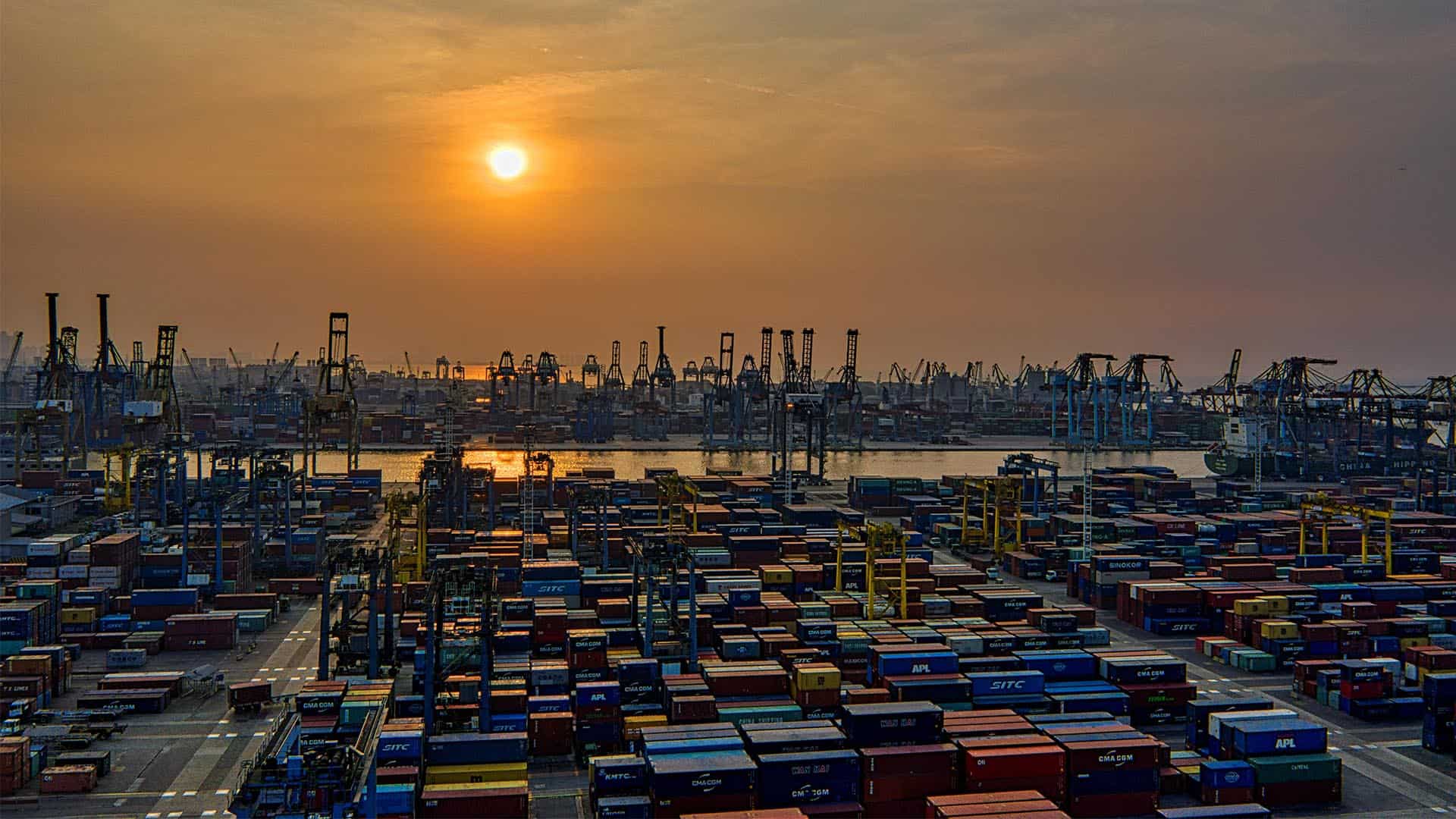As the impacts of COVID-19 are continuing to be felt across all sectors of industry, Doree Bonner have been liaising closely with the British Association of Removers (BAR) freight negotiation body, the Movers Trading Club – (MTC).
The MTC are in constant communication with the various shipping lines responsible for handling the cargo needs of the entire MTC membership and the statement below, from the MTC highlights the issues that are being experienced by movers and their customers.
Paul Felton, Commercial Manager of the Movers Trading Club Ltd, below explains the issues and problems currently facing the global container shipping industry and how these issues impact moving & relocation companies and their customers alike.
The demand for containerised shipping continues to defy expectations, the initial surge once shipping reopened after the pandemic wasn’t expected to last, however demand remains at unprecedented levels. As an example, export shipments from the UK, currently show a demand some 200% greater than the avaible space, that means for every container space a shipping line has avaible on their ships, there are at least two containers waiting to fill it.
This huge demand means that available space on ships is severely limited as shipping lines share this space among all their customers, but it also has a secondary equally challenging problem. The continued pressure on the associated infrastructure behind getting these containers onto ships, such as hauliers, port operations, storage and equipment availability.
These secondary issues have as much bearing on the ability to ship a container, as initially securing space on a vessel has, and I will further explain how each is affected in the current shipping environment.
The first element of a container move is haulage, an HGV is needed to collect an empty container from the port or terminal and deliver it to the customers residence or a warehouse storing the customers goods for loading and then return it to the port to be shipped. The latest figures showed the UK is short some 77,000 HGV drivers, this driver shortage plus the increased demand for drivers from other delivery sectors is severely impeding the shipping lines ability to provide haulage for its customers.
The second element is the port where the container is loaded onto the vessel, previously ports had excess capacity which allowed customers to store their goods while waiting for their vessel, this gave customers flexibility to allow them to load their goods when they wanted to and still wait for a future vessel. However due to the continued demand, these ports are now full and unable to provide this longer-term container storage.
Similarly affected are transhipment ports, these are ports usually in Asia where containers are taken off one vessel and loaded onto a connecting vessel. As these transhipment ports are full, the number of containers that can be accepted on a vessel are limited, this means shipping lines are not accepting as many bookings to locations that route via these transhipment ports. They have in certain cases even chosen to suspend services on a trade lane completely to alleviate this congestion and when this happens its usually done with little notice to their customers.
The congestion at ports has filtered through to all aspects of the move chain making it very difficult for shipping lines to operate, this consequently means shipping lines are likely to make last minute price increases, schedule changes or have vessels omit ports as they try to deal with the unprecedented demand and congestion.
Lastly each move requires an empty container into which to load the goods, due to the pandemic and continued demand a great many of these containers are now in locations that they aren’t required. Normally these empty containers would be repositioned to areas where they are required using the surplus capacity of the shipping lines vessels. However as there is currently no surplus capacity on these ships the shipping lines are experiencing severe shortages of equipment which is affecting their ability to accept shipments.
While these issues affect the whole global shipping landscape, I want to show how these issues directly affect moving companies and their customers:
Price volatility, while the shipping rates the MTC provides its member moving companies are generally fixed for a 12-month period, the current shipping environment means that shipping lines have and may well increase rates or apply congestion or service surcharges with very little notice, regardless of these agreements. When applied they are generally non-negotiable with the shipping lines giving the moving companies no choice but to pay the higher rates or surcharges if they wish to continue shipping. As these increases are therefore out of the moving companies hands they will unfortunately need to be passed on to the customers who are moving.
Availability, while pre-pandemic customers could usually move with a week or two’s notice, due to the current demand and lack of available space on vessels, it now takes some 6-8 weeks to find an available slot on a vessel, with some specific trades even worse. Therefore, moving companies customers need to understand that it is just not possible to move in a short period of time and need to be planning their moves well in advance. As moving companies now need to additionally ensure the shipping line has equipment, haulage availability and a load date that works for both the customer and is achievable within the parameters of the ports, which were all taken for granted prepandemic.
Then there all the other what ifs, due to the current circumstances the likelihood of a service failure from the shipping line performing the move has increased dramatically. This could be that on the customers scheduled day of loading, there isn’t a haulier available to deliver the container, there isn’t a suitable container available for the move, the vessel sailing date is delayed meaning the load date is now outside the acceptable window for the load port, or the vessel the shipment is supposed to sail on is now omitting its UK port of call.
If a shipping line is unable to provide haulage or a container on the day of loading, the shipping line may either simply cancel the booking, which means that the moving company and their customer would need to rebook the shipment and possibly wait another 6-8 weeks for new availability. Or the shipping line may offer an alternative load date, however the alternative date may mean the shipment now misses its intended vessel causing additional delays. In this situation there is little a moving company can do to solve this as they can’t force the shipping line to accept the container, this leaves the options as arranging another load date from the residence, or loading the goods back to a storage facility to await the new load date, however customers need to understand that either of these options are likely to incur additional charges from the moving company and should note that storage facilities are already full which may cause additional issues.
Due to the mentioned congestion, ports are only allowing moving companies to drop off a container 7 days prior to the vessels sailing date. This means the load date at the customers residence and the sailing date of the vessel are close. If a vessel is subsequently delayed and the load date now falls outside of the ports 7-day window, then the shipping line will not allow the moving company to load the container on the original date and a new date within the new 7-day window would need to be agreed. If the customers load date isn’t flexible this again may mean the moving company may well need to find a storage option for the customers goods with the associated additional charges.
If the scheduled vessel omits the UK load port, then the shipment will likely be rolled to another vessel, if the container is still to be loaded then the load date will be cancelled and a new date within the new vessels 7-day window will need to be found. If the container has already been loaded then the shipping line will generally absorb the port storage charges until it can load on a future vessel, but the customer will still experience significant delays.
Lastly shipping lines and moving companies are both affected by changes in staffing requirements since the pandemic occurred. Covid infections and the associated self-isolations or quarantines can happen at a moment’s notice, which when they do will cause operational issues. For shipping lines if discovered on a vessel, it will usually mean that ship can’t put into port for 14 days generating delays. For moving companies, it may well mean staff need to isolate at short notice, which may unavoidably force a customer’s move to be delayed or cancelled, however this is unfortunately outside of anyone’s control.
From the above summary of issues affecting the current shipping environment it should be obvious that international moving has become more problematic than ever. The demand for shipping means that shipping lines can almost operate with impunity as the moving companies and their customers have no choice but to use them and pay whatever price increases they may demand, or similar suffer an operational failing without any real recourse.
Customers about to move should appreciate that these issues are directly caused by the shipping lines inability to handle the current demand in global shipping. While the frustration this creates is understandable the moving companies are severely limited in what they can do if one of the above scenarios occurs. Moving companies just want to provide their customers the services they’ve agreed but the issues with shipping mean that this isn’t always possible. It is hoped by reading this that customers are helped to understand that the shipping element of a move is problematic and that any cost increase, service change or delay is not the fault of the moving company who will be doing all they can to assist, but is due to the current pressure on the global moving environment and the way shipping lines are currently operating.
Paul Felton
Commercial Manager – The Movers Trading Club Ltd.











